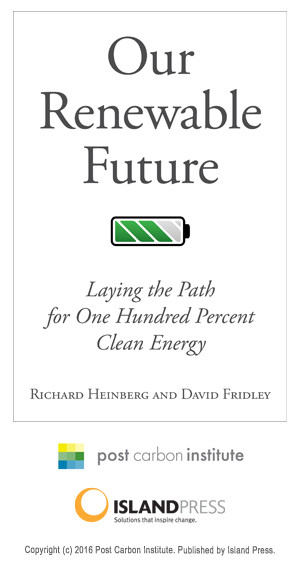
The book is online here, or can be purchased in various formats. A radio-ecoshock interview with Richard Heinberg on the issues in the book is here.
Its not just about making enough solar panels and wind turbines. There are the emissions from cement making. Cement requires 1500 degrees C, using energy for that. Many industrial processes and transport modes are also fossil fuel dependent. Cement holds down wind turbines. Replacement renewable energy powered processes are likely to be much more costly. Large earth moving equipments used in mining need portable high density energy. A lot of technology hasn't been tried without fossil fuels. Just making all the renewable energy infrastructure we need requires devoting remaining fossil fuels and carbon emissions budget, forgoing a lot of other consumption.
Plastics and pharmaceuticals are dependent on chemical feedstocks from oil and gas. There are not any known good substitutes. Choice between burning for energy, chemical manufacture, making infrastructure for a transition. The crunch comes sooner or later. We already need to be making renewable energy about 10 times faster, which means cutting out other uses of resources.
Getting fossil fuels out of agriculture is hard. Food processing is the biggest single area of energy use. Packaging, transportation and storage takes up more energy. All of the contributions add up to 10 times the delivered food energy. Natural gas stoves in peoples homes will end up disappearing, replaced by electricity powered cooking. Treatment of soil with agricultural chemicals degrades biological activity of topsoil, which loses more carbon. There is opportunity to enhance soil carbon with kinder soil practice, zero tillage, minimal chemical inputs.
Problem of energy use is proportional to population and per capita consumption. Scale of population is the biggest problem.
Energy justice is already a huge issue in the world. Wealth is proportional to energy use. If only the people with lots of money can afford a renewable energy transition, injustice will increase. Ownership and wide distribution of energy transition needs to occur.
Nuclear power is on the way out, for good environmental and economic reasons. It is expensive and risky. Governments have had to subsidize nuclear power for decades now, and it hasn't paid off.
Our current energy system is declining. Oil industry is declining. All the new oil prospects are very expensive, in price and carbon emissions.
If we don't chose to transition to renewable energy, we end up with no extra energy sources.
Changing energy systems means changing lots of other things.
Add Comment
This policy contains information about your privacy. By posting, you are declaring that you understand this policy:
This policy is subject to change at any time and without notice.
These terms and conditions contain rules about posting comments. By submitting a comment, you are declaring that you agree with these rules:
Failure to comply with these rules may result in being banned from submitting further comments.
These terms and conditions are subject to change at any time and without notice.
Comments